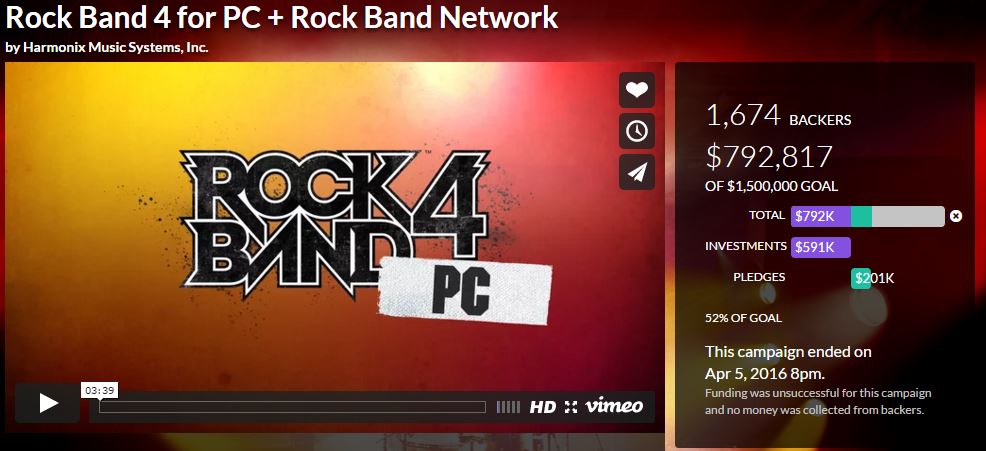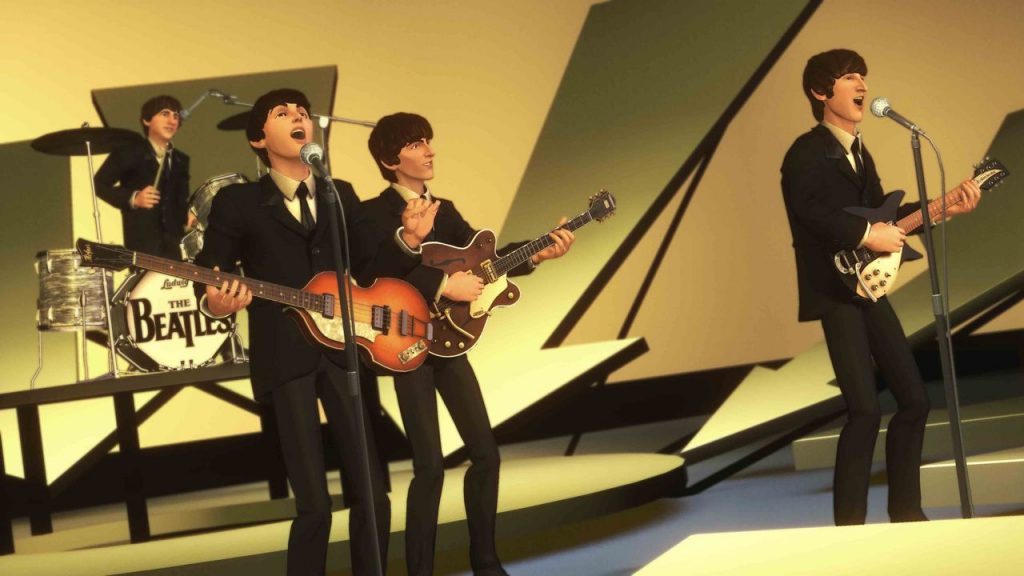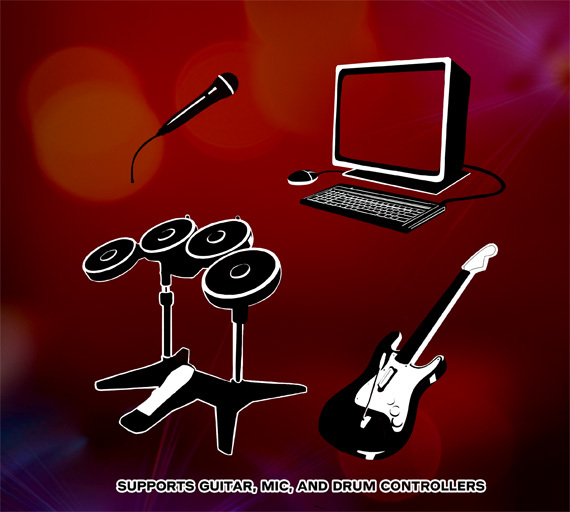Harmonix is one of those companies which has gained a lot of love over the years. Heck, as a rhythm gaming fan, they were at the top of my list for over a decade when it came to Western developers. All that good will between releases like Frequency, Amplitude, the early Guitar Hero titles, and eventually Rock Band, were simply fabulous. Then Harmonix came to Kickstarter in 2014 and things started to change. Why was such a successful developer seeking crowdfunding in such a short timespan? How could someone like them require fans to foot a nearly $800,000 bill to develop a remake of Amplitude? In the end, fans pushed the project through to success.
Since then, Amplitude (the new one) launched on PS4 as did Rock Band 4 on PS4 and Xbox One. The thing is, neither of these games were met with universal praise. In fact, many found Rock Band 4 lacking many of the features from previous titles, while Amplitude was still mostly the same old thing with a less compelling soundtrack. It seemed that maybe the team were losing touch with what made them so amazing to begin with. Then they launched a project on Fig to bring Rock Band 4 to PC (a first in the series) as well as bringing back Rock Band Network via the Steam Workshop. Why were they approaching Fig instead of Kickstarter again despite previous success on the platform?

It’s simple, really. Harmonix CEO Alex Rigopulos is on the advisory board of Fig. The same is true of folks like Tim Schafer who previously utilized Fig to fund Psychonauts 2. However, as we all know, things didn’t turn out well for Rock Band 4 on PC. The project ran its allotted month and ended at just over half the funding goal. $792,000 is a lot of money but not the $1.5 million Harmonix had asked for of backers. Much of that money came from investment rather than pure fan backer support. So how did this happen? Why wasn’t Rock Band 4 able to succeed? It seems there are many potential reasons which all played a part.
For one, many are still disappointed by how the Kickstarter project for Amplitude was handled. Were you aware that they still have not completed all rewards for that campaign?. There are those physical goodies which almost tempted me into backing which are just finally about to begin shipping out. Fortunately, the much-delayed PS3 release finally made its way out on April 11. As has been demonstrated with other projects, having an incomplete crowdfunding project while attempting to fund something else leaves many wary. Sometimes, folks also simply don’t find it fair for a company to ask for money year after year. The sentiment of some previous backers was that they should no longer need to ask for money after already asking for a boatload in 2015.

There’s also a definite perception of success surrounding Harmonix. After all, they created the first two Guitar Hero games and all of the Rock Band series! Gamers of a certain age are certainly aware of how monumental these peripheral-based games were in their time and how saturated the market quickly became with them. Just look at all those spin-offs! Not only that, Rock Band managed to achieve outrageous success by actually getting The Beatles on board at a point! Of course, this is just the perception of things rather than the reality. Harmonix was always under a publisher during these projects and there’s no doubt that a ton of that money went to publishers rather than into Harmonix’s pocket. In any case, that expectation of past monumental success makes it tougher for many to pledge funds.
In my opinion, one of the biggest reasons is the simple fact that this style of music game is really done in the modern era. Yes, there was a recent attempt at a resurgence with both Guitar Hero Live and Rock Band 4 but neither sold gangbusters. More so than a real lack of widespread affection for these musical peripheral-based games, there’s even less interest in the PC landscape. I recall playing Rock Band 2 religiously in college with my friends. We would all crowd around the living room and make up a complete band, with others sitting on the couch waiting for their turn in the limelight. This isn’t nearly as accessible a thing when you’re running a game on PC. Unless you’ve got a living room PC setup you’d somehow have to gather everyone around a computer monitor. Otherwise, you’d be playing Rock Band 4 solo – and that’s not nearly as fun. I just don’t think the demand was there for this style of game on PC.

You can look at other key missteps such as the fact that DLC would simply not be transferable. Sure, this is a technical restriction that makes total sense, but a sad one nonetheless. There was also the weirdness of how the project attempted to cajole Rock Band Network supporters into backing the project simply because this was the “only way” it would ever return. RBN was a great concept to let indie musicians get their tracks out there, but it felt a little unfair to force those RBN diehards to support the PC version to get this neat system back. Also, given how niche that audience actually was, it was a poor choice of headlining feature to get people rushing to pledge on Fig.
The scariest thing about this failure is that it probably means another round of layoffs is about to hit Harmonix. Sure, I don’t know any of this for a fact, but it seems to make sense. If Harmonix were completely financially sound, would they need to run two crowdfunding campaigns in two years? Would they hiatus projects such as Chroma just while they were beginning to gain positive attention? It seems that these are moves not made all out of greed or overvaluing their properties but moves that are necessary to aid the company. It’s possible Harmonix may return to Fig with Rock Band 4 again someday – or maybe even something else – but hopefully they’ll have gained some insight onto how to better handle future attempts.




I think demand affected this campaign too, exactly how many people wanted to play this game on PC?
Totally agree with you. As someone with all the versions of Rock Band and Guitar Hero (hey, the Green Day one was fun!), and thousands of dollars in songs I count myself as a hardcore fan. That being said, I was never tempted to back this one. It’s just not a game that I could ever see working on a PC. A lot of people chime in with the argument that I should just do the whole connected PC thing and put it on my tv, but at that point I may as well have the console versions going.
I, like Greg, wanted to back this game purely because of a long term love for Rock Band. However, once you think about it some more it just seems so weird. My PC is in a relatively small room with small screen. I would not invite people in there to play, but the most fun for me and Rock Band comes from playing with others!
Marcus, do you not think that the argument of it being on fig is also a valid answer? As in the site isn’t very that popular in itself and people are not fan of self-promotion.
Curious what Marcus will think about that. In my opinion I think that fig may have actually helped them because it gave them the opportunity for investment backers. I think the big problem was skepticism from gamers. In my Facebook feed I get Fig sponsored posts quite a bit, and every single one for Rock Band 4 was full of comments talking track about the fact that people didn’t want to back it for various reasons.
It is definitely possible. After all, we have seen other cool-looking projects fail on Fig because the potential audience just isn’t aware of it (not every game can be Psychonauts 2).
The reason I chose not to use this as a main reason in my article is because the majority of funding for Rock Band 4 came from potential investors and that’s something only Fig can offer. It appears that everyday gamers were very much *not* interested in Rock Band 4 in PC given they only pitched in a few hundred thousand. Investors were excited because… well, I guess the Rock Band name still curries some favor (though I question how serious these investors are given that the console versions of this game did not meet sales expectations – so why would anyone assume a less-desired PC version would?).
But you do not feel that backers seeing this whole self-promotion show with people on the board using their own platform to promote their games had any bad influence on it?
I know for sure that I, for example is something that is bothering me and wouldn’t back a game on fig whose producers is involved in the board (but i can only talk for myself).
Oh yes, I totally get what you’re saying about the self-promotion aspect. On one hand I get it, but also, if all you’re going to do is run a site where “friends and family” get to post their campaigns, it’s going to dry up pretty fast. Also, that is antithetical of their mission statement which basically said it would host both large campaigns and unknowns.
I personally dislike that the board members get to host their own projects there like that. It seems kind of unethical even though I guess it’s fair… they made the site after all. I also don’t like that they can fudge the rules – for example, Fig can and has extended the time frames for some projects when they were having trouble (but not others). Seems totally unfair.